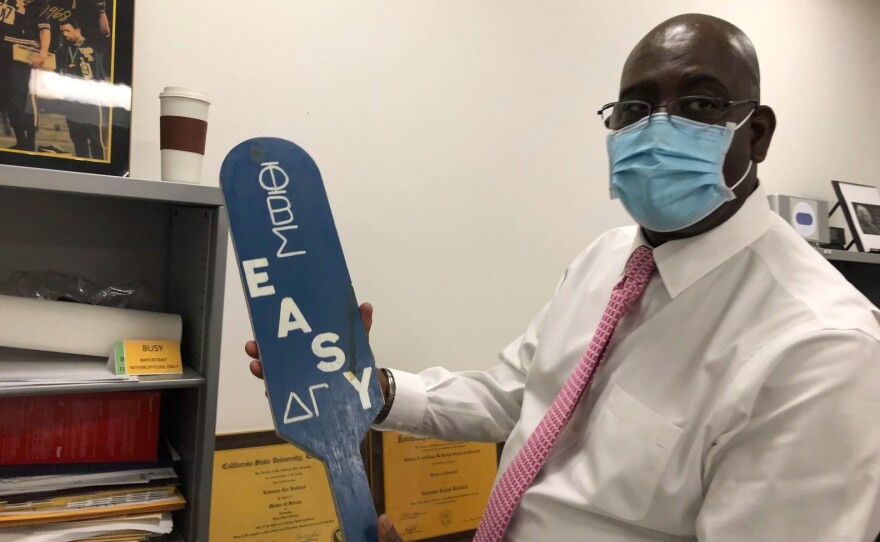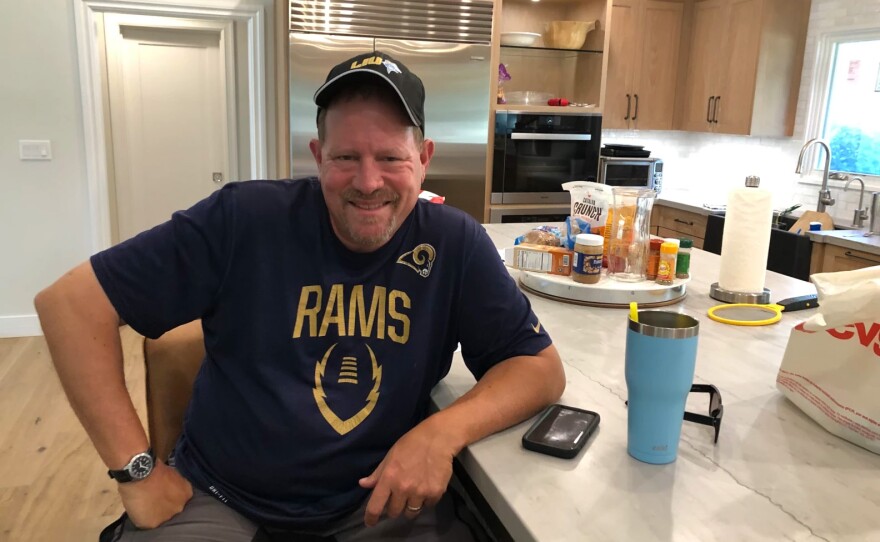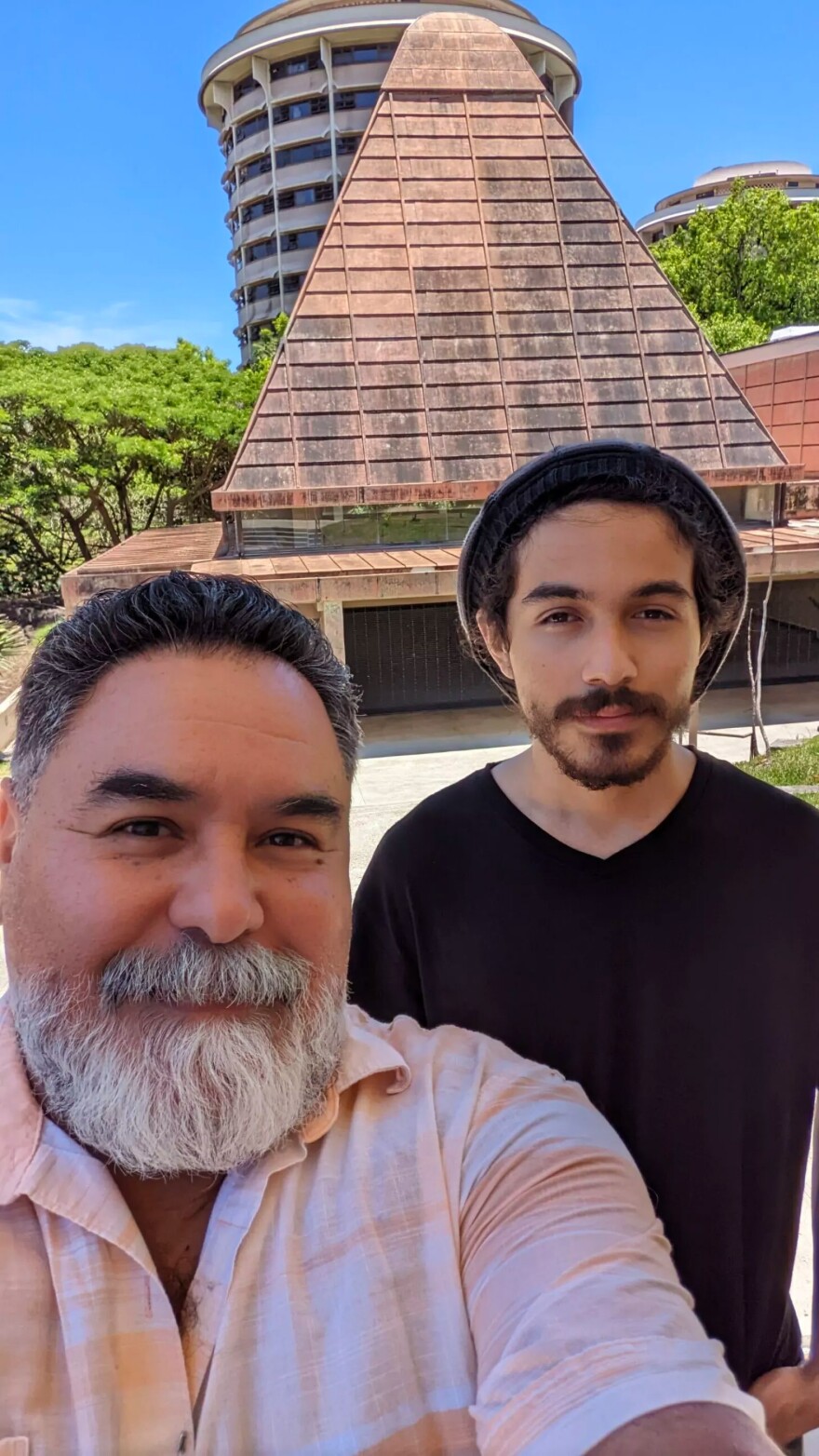We are in the middle of a highly emotional season. Parents and caregivers have been helping their first-year college students pack up prized sandals and hoodies in collapsible bags, drive and fly their young adults to campus dorms or apartments, say goodbye, and return home with fraught emotions.
“When I sent my son off to college, I think I might have actually been clinically depressed,” said Robin Perry, who helped his first son, Miles, move into dorms at the University of Pittsburgh three years ago.
“I just felt so sad. And I missed him so much,” he said.
Perry said these feelings began weeks before the move and continued after he and his wife said goodbye and returned home to Long Beach. Their son is the oldest of two children.
Back home, Perry stood outside his son’s bedroom. It was empty. He said his son’s absence led him to stay later at work. He’d come home, eat, and go to bed. In between, he used a smartphone tracking app that was still on his son’s phone to follow an electronic dot on the screen, representing his son, as it moved around the Pittsburgh campus. The feelings lasted for nearly a month.
There are all kinds of gender and caregiver variations, with the relationship between a father and his eldest son being just one of them. But researchers say the father-first son relationship is worth spotlighting because of how common it is, the little attention it has been given, and the potential it holds for helping turn around recent trends that show significant drops in male college enrollment and degree completion.
There's no personal template for seeing your son off to college
Those feelings Robin Perry had are alive and well among fathers now.
They're alive in me. My son, Jordan Guzman, is starting his freshman year at UCLA this fall. I delved into this topic in part to make sense of my own emotions about the unknown future of my relationship with my son. That motivated me to reach out to people like Lawrence Bradford.
Disbelief set in this spring at Bradford's son’s high school graduation ceremony. On a big screen, the school projected a picture of his son, also named Miles, and the college he was bound for, UC Berkeley. About two weeks before Lawrence and his wife prepared to drive their son to the Bay Area, anxiety set in. It’s triggered still as his son has scheduled goodbye dates with friends who are moving away to colleges like UCLA and Morehouse.
"When I sent my son off to college, I think I might have actually been clinically depressed."— Robin Perry, on his feelings after his son moved into the dorms at the University of Pittsburgh
“This is surreal, man, he's actually going to be gone. He's actually going to be at the university, studying his major. And I'm not going to see him every day,” he said.
The feelings have led Bradford to look for a photo of himself in academic regalia at the USC ceremony from when he earned his doctorate, his baby son in his arms.
Part of the anxiety about this transition, he said, may come from the fact that Bradford can’t tap into memories and feelings of how his own father saw him off to college.
“I lost my dad when I was 12 [years old],” he said.
His father wasn’t there to watch him learn to shave or cheer him on at his high school games. But Bradford did take an idea for this moment from a father he looked up to: TV’s Cliff Huxtable in “The Cosby Show.” Bradford remembers an episode in which the Huxtables gather for a special dinner for Theo, the first son going off to college. So Bradford and his wife did the same at a restaurant.
“I can remember, you know, saying, ‘this is the day that I've looked forward to, that my son will be going out to college,’ I got very emotional, my wife got very emotional,” he said. He has his own lived experience but he also knows so many young men his son’s age who don’t have fathers, uncles, or other older males who can step into this role.
Bradford is a longtime college administrator with a specialty in student recruitment and enrollment. So his son’s acceptance into UC Berkeley as an aerospace engineering major is a triumph for Bradford as a father and a professional.

A day before Bradford and his wife drove their son to Berkeley, father and son stepped over half a dozen duffle bags in the family’s dining room in their home in L.A.’s View Park neighborhood.
Bradford watched a YouTube video tour of the dorm building where his son’s moving into. And Miles explained that he’s had to leave some basketball shoes behind even though one of the duffles is filled with Air Jordans.
Miles's father doesn’t support his son taking any more shoes. That’s fine, Miles says, as he talks about another kind of support he expects from his father during the new stage in their relationship.
“I just really hope that he's just continued to be there for me, just as he always has been,” he said. “I would assume he's definitely going to make sure to check up on me, make sure I'm good. And make sure I'm, you know, eating right, make sure I'm getting my homework done and stuff like that.”
Support is the key for Miles and any first year college student. But the kind of support Miles is talking about sounds like what you’d expect to hear from a young man whose father is a college enrollment administrator.
Lawrence Bradford has talked recently to his son about alcohol, dating and romance. They also talked about interacting with the police, in anticipation that the decisions his son makes on his own, away from his parents, may have more serious consequences for him because he is a young Black man in the United States.
Those conversations may be the foundation of their relationship from here on out.
We can all learn from others
Talking about fathers and their first sons going off to college is not as narrow a conversation as it may appear. Races, ethnicity, social and economic class all make the topic nuanced.
Nevertheless, there is one overarching feeling fathers share.
“There's this, this pride of, 'my son is going to college,' and that pride is consistent across different groups and backgrounds,” said Derrick Brooms, a professor of Africana Studies and Sociology at the University of Tennessee, Knoxville and a research associate with the California State University Young Males of Color Consortium.
But another common feeling follows from pride, too.
Some Advice For Dads
Your mileage may vary, but we collected some sage advice from the fathers in this story:
- Do trust that you’ve done the right thing as a parent
- Do share your feelings with your son
- Do create networks with dads you know to talk about what you’re thinking and feeling
- Do offer other dads to step in to check on their son when appropriate
- Do not try to re-create your college experience with your son
- Do not micro-manage your son’s academics
- Do give your son space to grow
- Do not think of your lack of college experience or degree completion as a deficit
- Do look at your son’s college transition as an opportunity for your own growth and learning
“There's also some concern. And that concern could [be] from how fathers might think they might be able to support,” he said.
Brooms says there are “manhood scripts” where fathers only take on limited roles leading up to this college transition, like that of taskmaster or chief financial officer; the father as provider for the son while the son is living in the house. These scripts are filled with ‘have you done this’ and ‘can we afford that’ questions. Some fathers may see no other roles than these.
But Brooms says there are other roles for fathers that are arguably just as important if not more so. These are roles in which the father becomes a confidant, a guiding voice, a listener and encourager of the son’s social and emotional well being.
Engagement is key. If a father feels he can’t contribute to a son’s college transition in one way, he shouldn’t give up.
“I think as educators, we ought to encourage our parents that there are many, many contributions that they can make, even through lived experiences,” Brooms said.
Finding the right balance of the variety of roles fathers can play, Brooms says, is key because research suggests family emotional support is one of the most important ingredients for a first year college student to become a college graduate.
"I think as educators, we ought to encourage our parents that there are many, many contributions that they can make, even through lived experiences."— Derrick Brooms, professor of Africana Studies and sociology, University of Tennessee, Knoxville
Supporting fathers may help address something that’s troubled Brooms and others in higher education in recent years: the proportion of men enrolling in college and earning degrees has dropped significantly in recent years.
In the decades after World War II, women were a minority on college campuses. And as recently as 1972, men used to earn college degrees in a proportion 12 percentage points higher than women. Now that gap has widened but in favor of women, who earn degrees at higher rates than men.
And the proportion of male enrollment on campus is dropping. At the largest public university system in the country, the 23-campus California State University, 42% of total enrollment is male, down two percentage points in the last five years. About 49% of the male population in the U.S. is male.
All is not well with the male college pipeline in the United States. It’s been called a crisis.
Father engagement is critical to education outcomes across the board, Brooms says, so it’s key to look at the various ways fathers are engaged with their sons.
Having even more to fffer
For the Downey family in L.A.’s Northridge neighborhood there’s a palpable enthusiasm between father and the first son for what the future may bring their relationship.
The enthusiasm is mixed in with all the evidence that a young man is going off to college.
“A lot of the dorm stuff is coming in and we got those giant blue bags to put all our stuff away and so we're definitely prepping,” said Charlie Downey, who will be a freshman this fall playing water polo at Long Island University.

It’s the kind of enthusiasm you feel at a Dodgers game now or watching the Lakers with Kobe Bryant.
This didn’t happen by accident. Charlie’s father, Jake, began working in sports broadcasting decades ago and runs a video production company. He knows high school sports well. And Charlie says all of this knowledge helped him get recruited into a college he feels is the right fit for him.
What image comes to mind when Charlie thinks about saying goodbye to his father after he’s helped him move into the dorms?
“Oh, man. I don't even want to think about that one. I think we'll have to belly bounce one last time,” Charlie said.
Yes, they’ve been belly bouncing since Charlie was a kid. It sounds like he got hurt once.
The two demonstrate how they’ve perfected the move. On either side of their kitchen they start a slow trot towards each other, their jump is low and synchronized so that their two bellies high five each other and repel each other, more or less equally now that they’re approaching the same size.
"I'm looking forward to Charlie as an adult. I think I'll have more to offer him in the workplace, maybe in the game of love and just navigating life."— Jake Downey, dad to Charlie Downey
“I'm looking forward to Charlie as an adult,” Jake Downey says. “I think I'll have more to offer him in the workplace, maybe in the game of love and just navigating life.”
And that’s not to say, Jake says, that he wasn’t present during Charlie’s childhood; he was. But he’s looking forward to talking to him as a growing man about romantic relationships, life in different parts of the United States; and, of course, sports.
“I'm looking forward to watching him mature into young adulthood,” Jake says.
Filling a physical absence with a growing intellectual relationship
In Long Beach, Juventino Gutierrez II is back from Hawai’i where he and his wife helped his oldest son, Juventino Gutierrez III, move into an apartment for his freshman year at the University of Hawai’i at Manoa.
“I feel that it's both the end of something, finally, and the beginning of something else,” Gutierrez, the father, said.
Like Jake Downey, Gutierrez shares a strong bond with his son. Gutierrez said his son has been as important as his right hand: he's called on his son to help with taking out the trash, walking the dog, and assorted maintenance work on the house. Gutierrez has been a political and social activist since college. He’s shared those stories with his son and that’s created an intellectual bond between the two.
"[He] and I talk a lot about politics, about cultures, about things we see on television. That's one of the adjustments ... that I'm gonna be missing that part of our relationship."— Juventino Gutierrez II, dad to Juventino Gutierrez III
“[He] and I talk a lot about politics, about cultures, about things we see on television, things we heard,” he said.
“That's one of the sort of adjustments that I'm beginning to realize that I'm gonna be missing that part of our relationship.”
But just a few days after he arrived back in Long Beach, Juventino got a text from his son telling him that the Black student organization is strong, the Latino student group needs re-invigoration and that he’s excited about the ethnic studies class offerings.

The son ends the two paragraph text with, “l’ll talk story with you later,” a reference to a way of dialoguing based on an exchange of stories. Juventino the son is majoring in anthropology, his father’s major in college.
The loss of an important conversation partner at home, and a fellow maintenance assistant, is tempered by his son’s budding interests.
“It's a mixed bag of emotions,” Gutierrez said.
The kind of relationship he’s hoping blossoms between him and his son is something Robin Perry has been seeing in the last three years.
“Our relationship really kind of evolved from not merely just sort of a father-son relationship, but it evolved into a more of a friendship, more of an advisor type relationship,” he said. And Perry said it helped to talk to other dads and learn to let go and embrace his son’s different needs.
There’s a fringe benefit too. This year Perry is sending his second child, a daughter, off to her freshman year at Emory University. Along the way he and his wife talked to their son about how to handle that experience.
“We actually go to him for advice, in terms of what we should do, what we shouldn't do,” he said.
“There is life on the other side of this college thing.”
-
After a state audit found the San Diego County Sheriff’s Department failed to adequately prevent and respond to the deaths of individuals in its custody, San Diego Assemblywoman Akilah Weber wrote the, “Saving Lives In Custody Act.” Governor Gavin Newsom vetoed the bill on Friday. Then, a sailor charged with intentionally setting the fire that destroyed the Navy ship the USS Bonhomme Richard was acquitted in a military court. Reporting by ProPublica uncovered systemic failures that contributed to the destruction of the $1.2 billion dollar warship.
-
California is experiencing the driest three years ever recorded and we’re on track for a fourth year. In other news, Tijuana gas stations are capitalizing on California’s record-high gas prices. Plus, the San Diego Zoo Wildlife Alliance is celebrating their first successful breeding of an endangered Indian narrow-headed soft-shell turtle.







